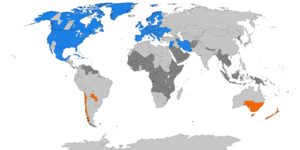Daylight saving time facts for kids
Daylight saving time (DST), also called summer time, is when clocks are set forward by one hour during the warmer months. This makes the sun stay visible for longer in the evening. People then set their clocks back one hour in the autumn.
DST can help shops that are open after people finish work. It can also lower the number of traffic accidents. Sometimes it saves energy, but other times it might use more.
Most countries in the world do not use DST. But it is very common in Europe and North America.
Countries like the United States, Australia, the United Kingdom, and Canada use DST. However, some parts of these countries do not:
- In the United States: most of Arizona and Hawaii.
- In Australia: Queensland, Western Australia, and the Northern Territory.
- In Canada: nearly all of Saskatchewan and the Yukon Territory.
Some European countries, like Iceland, Russia, and Belarus, do not use DST.
Contents
How Daylight Saving Time Works
Daylight saving time usually starts in spring and ends in autumn. When it starts, people move their clocks forward by one hour. This means that 2:00 AM suddenly becomes 3:00 AM. When it ends, people move their clocks back by one hour. So, 3:00 AM becomes 2:00 AM again. This gives people an extra hour of sleep on that day!
Daylight Saving in Europe
Since 1971, most countries in the European Union have changed their clocks on the same days. European Summer Time starts on the last Sunday in March. Clocks go forward by one hour at 1:00 AM UTC (Coordinated Universal Time). It ends on the last Sunday in October. Clocks go back by one hour at 1:00 AM UTC.
Daylight Saving in the United States
In the United States, daylight saving time starts on the second Sunday in March. It ends on the first Sunday in November. Just like in Europe, clocks move forward one hour in March and back one hour in November.
Idea for Permanent Summer Time
Some people in northern countries, like the UK, have thought about having "permanent summer time." This means they would stay on the time used during summer all year round.
This idea was tried in Britain between 1968 and 1971. The clocks stayed one hour ahead of Greenwich Mean Time (GMT) all year.
People who support this idea say it's safer for kids. They wouldn't have to come home from school in the dark. Also, evening activities would be brighter. It might also reduce accidents and save fuel.
However, some farmers in northern areas don't like this idea. In winter, the sun would not rise until around 10:00 AM. But the National Farmers Union in the UK has said they are mostly okay with the idea now.
Automatic Clock Changes
Many mobile phones and computers that are connected to the internet can change their clocks automatically for DST. This means you don't have to remember to do it yourself! However, sometimes computers might not adjust correctly or on the wrong date. If a computer has more than one operating system, it might even change the time more than once.
Images for kids
-
William Willett also suggested DST in 1907 and worked hard to make it happen.
-
This sundial in Petts Wood, London, is a memorial to William Willett. It always shows daylight saving time.
See also
 In Spanish: Horario de verano para niños
In Spanish: Horario de verano para niños
 | Shirley Ann Jackson |
 | Garett Morgan |
 | J. Ernest Wilkins Jr. |
 | Elijah McCoy |








